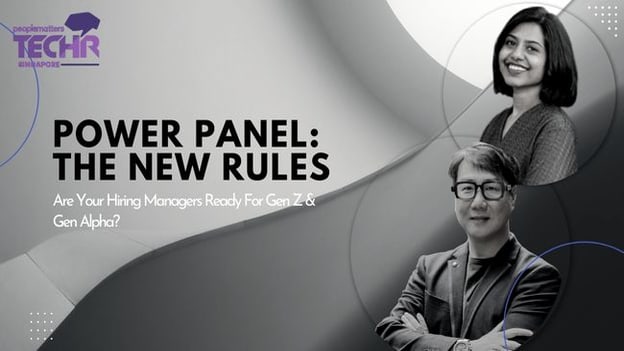Power Panel: Are Gen Z and Alpha redefining the role of HR managers?

With trends and times changing in a supersonic mode, leaders are forced to #Rethink - are their strategies enough to manage the next generations? To answer this significant question and to discuss the future of work, we sat down with Anjali V Menon, HR Director – Malaysia, Friesland Campina (Dutch Lady Milk Industries), Lewis Ng, Chief Operating Officer, SEEK Asia, and Ivy Paraluman Fajardo De Borja, VP for Culture & People, Acquire BPO, during People Matters TechHR Singapore’s Power Panel session.
We know that right now Millennials (born between 1981 to 1996), occupy the largest segment in the workplace. However, just when the leaders thought they got familiar with Millennials, new generations – Gen Z (1996 – 2010) and Gen Alpha (born after 2010) are gearing up to enter the workforce. Hence, it’s essential to understand Gen Z and Alpha’s necessities to create a work environment that encourages them and the organisation to succeed.
Attracting and retaining Gen Z and Alpha
With Gen Z and Alpha going to be the new workforce, managers are tasked with the responsibility to bring the best out of them. In order to do so, the most important factor is to attract and then retain them with good policies. Lewis Ng, who is Chief Operating Officer at SEEK Asia, suggested ways to achieve the same.
“As leaders, we need to understand that Gen Z and Gen A are not concerned about stability and money. They are more interested in things like - the purpose of what the company is doing, development as an individual, style of working and flexibility. Incorporating these values will help the brand to have a newer and brighter workforce,” told Lewis Ng.
Elements crucial to engaging Gen Z and Gen Alpha workforces
Modern workforces are comprised of as many as four generations, each with unique demands. When it comes to Gen Z and Gen A, companies must modernise their internal communications. Anjali V Menon, who is HR Director – Malaysia at Friesland Campina (Dutch Lady Milk Industries), believes that brands should focus on these four factors to engage newer talents.
“Millennials and the generations post them have been very particular about meaningful workplaces. And the meaning can range from what happens day-to-day to the core value of the brand. Other than this, financial rewards and potential career advancements can also add up. However, most generation Z-ers in the workplace look for stability in four pillars of the company, comprising of purpose, people, performance and potential,” described Anjali V Menon.
She further explained how to make these four pillars work in an organisation. “In terms of purpose, it needs to be something which appeals to talents as an aspiration. Then comes people, they are the ones who drive the business. That's the reason it’s placed before the business performance. The third part of the pillar is performance because business needs to perform so that we can invest, grow and contribute more. The last part is potential and that's where the aspiration quotient comes in because if you show a pathway to your employees, you’ll grow as a larger community,” she said.
Implementing positive work culture
Organisation across the globe develops their distinct culture, shaped by their values, priorities and people, who work there. For the next generations, the focus has vastly shifted to providing a workplace where employees feel valued, safe, comfortable, and flush with growth opportunities. Lewis Ng suggested a new-age way to accomplish the same.
“A lot of different programs are there to incorporate value and culture. The most common one is appraisal reviews. While I think this is one very practical approach, however, Gen Z and A, may not be very receptive to it as its format is very different to anything that they're used to. That’s why; I would recommend introducing a new method as we have in our organisation. We introduced an app, whose purpose is to enable all colleagues to recognise and show appreciation towards each other,” Lewis Ng revealed.
“Through the app, the idea is to show and encourage others to appreciate and value other talents. Basically, the core value of the company will not change, but the way that you are starting to communicate and engage with people, given the changing nature of your employees has to change,” he added.
Preparing leaders of today and tomorrow for the newer workforce
Today, HR leaders’ responsibilities are to attract and retain talents, develop leaders, manage performances, driving diversity and inclusion strategies. With changing times, now more than ever, they need to be deeper thinkers and more intentional about culture for the newer generation. Anjali V Menon listed a few points HR managers need to focus on:
“Newer generation needs a sense of belongingness. To create that, it’s important to build trust, as it will lead to a transparent system. People need to feel safe enough to be their true selves. To achieve this, managers must establish –
- Regular check-ins or communication
- Assist talents in becoming better problem solvers
- Think strategically, and
- Provide feedback
This year, People Matters hosted the Power Panel session, where CHROs tackled present-day most pressing people and work dilemmas. From work models to redefining employer brand for new gen, to efficiency and effectiveness of Tech Stack, finding solutions was the top priority at the People Matters Tech HR Singapore Power Panel session.















